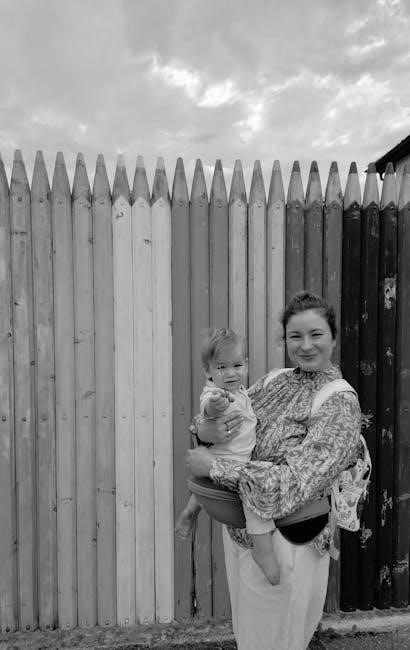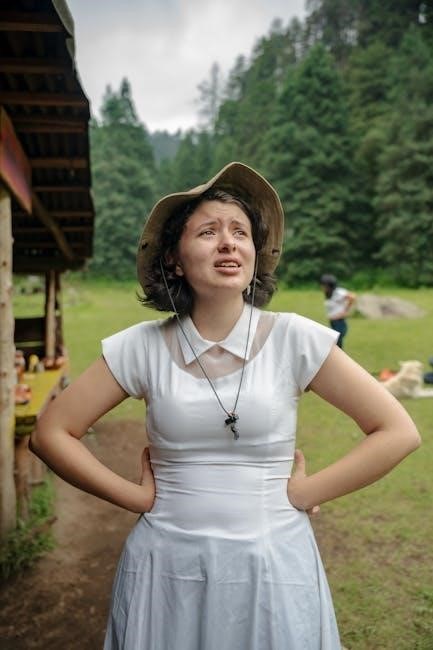The nuclear family‚ often idealized‚ has proven flawed in modern society‚ leading to economic strain‚ emotional distress‚ and social isolation‚ prompting a rethink of family structures․
The Concept of the Nuclear Family
The nuclear family‚ traditionally defined as a small‚ self-sufficient unit consisting of parents and their children‚ has long been promoted as the ideal family structure in industrialized societies․ This model emphasizes privacy‚ independence‚ and emotional reliance solely within the immediate family․ However‚ critics argue that this structure isolates individuals‚ placing undue economic and emotional burdens on the family unit․ The idea that the nuclear family is the only viable or natural arrangement has been increasingly challenged‚ with many pointing to historical and cultural variations in family systems․ This rigid model‚ often disconnected from extended kin‚ has led to calls for a reevaluation of its viability in modern times․
The Rising Critique of the Nuclear Family Model
Recent years have seen growing criticism of the nuclear family model‚ with scholars and thinkers like David Brooks arguing it is inherently flawed․ Critics highlight its inability to provide adequate support systems‚ leading to emotional and financial strain; The model’s emphasis on self-reliance often leaves families isolated‚ without the broader community ties that once sustained them․ This critique suggests the nuclear family‚ while once functional‚ now struggles to meet the demands of modern life‚ prompting calls for alternative family structures that foster greater interconnectedness and shared responsibility․ Such arguments challenge the long-held notion of the nuclear family as the optimal social unit․
Thesis Statement: The Nuclear Family as a Mistake
The nuclear family‚ often hailed as the cornerstone of society‚ is increasingly viewed as a flawed model that fosters isolation and inequality․ Its emphasis on self-reliance has led to economic pressures‚ emotional strain‚ and a decline in community support systems․ Critics argue that the nuclear family structure‚ rooted in industrial-era values‚ fails to adapt to modern challenges‚ leaving many individuals and households struggling to cope․ By examining its historical rise‚ societal impact‚ and critiques‚ this analysis contends that the nuclear family model is not only outdated but also detrimental to individual and collective well-being‚ necessitating a reevaluation of family structures․

Historical Background of the Nuclear Family
The nuclear family emerged as a dominant structure during the Industrial Revolution‚ shifting from extended kinship ties to smaller‚ self-reliant units‚ driven by economic and urbanization pressures․

Pre-Industrial Family Structures
In pre-industrial societies‚ families were typically large and extended‚ with multiple generations living together․ This structure provided economic support through shared labor and resources‚ fostering strong community ties․ Such setups were common in agrarian communities‚ where collective effort was essential for survival․ The extended family system offered a built-in support network for childcare‚ elder care‚ and financial assistance․ This communal approach to family life stands in stark contrast to the isolated nuclear family model that emerged later․ These pre-industrial structures were deeply rooted in tradition and cultural norms‚ emphasizing interdependence over individualism․
The Rise of the Nuclear Family in Industrial Society
The shift to industrialization marked the emergence of the nuclear family‚ characterized by a focus on the immediate family unit․ Urbanization and factory work replaced agrarian life‚ reducing the need for extended family labor․ Economic pressures led to smaller households‚ as families relied on wage earners rather than collective effort․ This structure emphasized privacy and autonomy‚ aligning with capitalist values․ However‚ it also isolated families from broader support networks‚ increasing dependency on individual incomes․ The nuclear family became the cultural ideal‚ despite its inherent vulnerabilities‚ such as reduced support systems and heightened economic risks․
Cultural and Economic Factors Shaping the Nuclear Family
The nuclear family emerged as a dominant structure due to cultural and economic shifts․ Industrialization emphasized individualism and self-reliance‚ aligning with the nuclear family model․ Capitalist values promoted privacy and autonomy‚ while urbanization reduced reliance on extended kin․ Economic pressures‚ such as the need for wage earners‚ further solidified this structure․ Cultural ideals of marital love and child-rearing within a private sphere were central․ However‚ this model often isolated families‚ making them dependent on single incomes and lacking broader support systems․ These factors‚ while shaping the nuclear family‚ also exposed its vulnerabilities‚ such as heightened economic risks and reduced communal assistance․
Critiques of the Nuclear Family
The nuclear family has faced criticism for fostering emotional strain‚ economic pressures‚ and social isolation․ Its structure often lacks external support‚ intensifying household burdens and limiting flexibility․
Economic Pressures on the Nuclear Family
The nuclear family model often relies on a single income‚ creating significant economic strain․ Rising living costs‚ coupled with the necessity for both parents to work‚ exacerbate financial pressures․ This structure limits flexibility‚ as caregivers must balance work and childcare‚ often leading to increased stress․ The absence of extended family support amplifies these challenges‚ making it difficult for nuclear families to manage economic hardships․ Such pressures highlight the model’s inability to adapt to modern economic realities‚ contributing to its criticism as an unsustainable structure for many households today․
Emotional and Psychological Strain
The nuclear family model often leads to heightened emotional and psychological strain due to its isolating nature․ Parents bear the primary responsibility for emotional support‚ creating undue stress․ Children may feel overwhelming pressure to succeed‚ while the lack of extended family ties exacerbates feelings of isolation․ This structure can foster anxiety‚ depression‚ and burnout‚ as caregivers struggle to meet demands without external support․ The emotional burden placed on a single family unit highlights the nuclear family’s limitations in providing mental well-being‚ further critique of its sustainability in modern society․
Social Isolation and Lack of Support Systems
The nuclear family structure often leads to social isolation‚ as individuals rely solely on their immediate family for support․ This contrasts with extended family systems‚ where multiple generations share responsibilities․ The absence of broader community ties can intensify feelings of loneliness and disconnection․ Parents‚ particularly in single-income households‚ bear the weight of caregiving without external aid‚ exacerbating stress․ Children‚ too‚ may lack diverse role models and support networks․ This isolation underscores the nuclear family’s limitations in fostering collective well-being‚ highlighting the need for stronger community and extended family connections to alleviate emotional and practical burdens in modern life․

Impact on Individuals and Society
The nuclear family model exacerbates emotional strain‚ economic pressure‚ and social disconnection‚ affecting mental health and societal cohesion while limiting collective support systems for individuals․
Effects on Mental Health
The nuclear family structure often leads to heightened emotional strain and mental health challenges due to its isolative nature․ Without extended support systems‚ individuals face increased stress from financial pressures and caregiving responsibilities․ This isolation can exacerbate anxiety‚ depression‚ and feelings of overwhelm‚ particularly in single-income households․ The lack of shared responsibilities and emotional support networks within nuclear families can further compound these issues‚ leading to burnout and decreased well-being․ As societal expectations continue to shift‚ the mental health toll of the nuclear family model becomes increasingly apparent‚ highlighting the need for alternative support structures․
Gender Roles and Inequality
The nuclear family model often reinforces rigid gender roles‚ perpetuating inequality․ Traditional expectations assign caregiving and domestic duties to women‚ while men are seen as primary breadwinners․ This division limits women’s career opportunities and reinforces wage gaps․ Men‚ too‚ face constraints‚ as societal pressures often prevent them from embracing caregiving roles․ Such rigid gender roles hinder personal growth and equality‚ perpetuating systemic disparities․ The nuclear family structure‚ by isolating caregiving responsibilities within the household‚ exacerbates these inequalities‚ making it difficult for individuals to challenge or redefine their roles․ This perpetuates a cycle of gender-based inequality‚ highlighting the need for more equitable family structures․

Decline of Community and Extended Family Ties
The rise of the nuclear family has led to the erosion of community and extended family bonds․ Traditionally‚ families relied on broader networks for support‚ but the nuclear model emphasizes self-sufficiency‚ isolating individuals․ This shift has weakened intergenerational ties and shared responsibilities‚ leaving many without safety nets․ The loss of communal living and extended family support systems has heightened emotional and economic pressures‚ particularly for caregivers and single parents․ As society moves away from collective caregiving‚ the decline of these ties deepens social isolation‚ underscoring the limitations of the nuclear family structure in fostering resilience and connection․

Alternatives to the Nuclear Family
Alternatives include extended families‚ communal living‚ and blended households‚ offering shared responsibilities and emotional support‚ addressing the limitations of isolated nuclear family structures effectively․
Extended Family Structures
Extended family structures offer a robust alternative to the nuclear family‚ emphasizing shared responsibilities and collective well-being․ By incorporating grandparents‚ aunts‚ uncles‚ and cousins‚ these systems provide emotional and financial support‚ reducing the burden on individual parents․ Historically prevalent in many cultures‚ extended families foster stronger intergenerational bonds and a sense of community․ This model often leads to better child-rearing environments‚ as multiple caregivers contribute to a child’s development․ Additionally‚ extended families can share household tasks‚ easing economic pressures and promoting overall stability․ In contrast to the isolation of nuclear families‚ extended structures create a safety net‚ enhancing resilience and social cohesion in contemporary societies․
Communal Living and Shared Responsibilities
Communal living and shared responsibilities offer a viable alternative to the nuclear family‚ fostering collaboration and mutual support․ By pooling resources and dividing tasks‚ individuals reduce economic and emotional burdens․ This model often includes shared housing‚ childcare‚ and financial contributions‚ creating a network of care․ Historically‚ communal living has been practiced in various cultures‚ emphasizing collective well-being over individualism․ Modern examples include co-housing communities and intentional living arrangements․ Such systems not only alleviate the pressures of nuclear family life but also promote a sense of belonging and social connection․ They highlight the potential for reimagining family structures to prioritize shared responsibility and community resilience․
Modern Family Arrangements and Blended Families
Modern family arrangements and blended families represent a shift away from the traditional nuclear model‚ offering diverse structures that better suit contemporary needs․ Blended families‚ formed through remarriage or partnerships‚ often include step-siblings and step-parents‚ creating complex yet resilient units․ Single-parent households‚ childless couples‚ and multi-generational families further illustrate the variety of modern arrangements․ These structures emphasize adaptability and resilience‚ challenging the limitations of the nuclear family; They reflect societal changes‚ such as increased divorce rates‚ delayed marriage‚ and shifting gender roles․ By embracing diversity‚ modern families address the emotional and economic pressures that the nuclear model often cannot‚ fostering innovation in family dynamics and support systems․
Economic and Social Challenges
Rising living costs and single-income households strain nuclear families‚ while inadequate support systems exacerbate financial and caregiving burdens‚ highlighting the model’s economic vulnerabilities in modern society․
Rising Costs of Living and Single-Income Households
The nuclear family model often relies on a single income‚ exacerbating economic pressures as living costs surge․ This structure‚ once viable‚ now strains households‚ making it difficult to sustain basic needs․ With inflation and housing expenses climbing‚ single-income families face financial instability‚ limiting opportunities for education‚ healthcare‚ and savings․ The reliance on one breadwinner leaves little room for economic flexibility‚ disproportionately affecting women who often bear caregiving roles․ This outdated model fails to adapt to modern economic realities‚ highlighting the need for alternative family structures that distribute responsibilities and income more equitably‚ ensuring greater financial resilience and social stability in contemporary society․

Work-Life Balance and Caregiving Responsibilities
The nuclear family model often places undue burdens on caregivers‚ primarily women‚ leading to poor work-life balance and emotional exhaustion․ With limited external support‚ caregiving responsibilities fall heavily on individual families‚ exacerbating stress and burnout․ This structure frequently results in one parent shouldering the majority of childcare and household duties‚ while also maintaining a career‚ leading to mental and physical strain․ The lack of shared responsibilities within the nuclear family framework fosters inequality and limits opportunities for personal growth․ As societal demands evolve‚ the need for equitable distribution of caregiving roles becomes increasingly critical to ensure the well-being of all family members and promote sustainable work-life harmony․
Impact on Child Development and Education
The nuclear family structure often limits children’s access to diverse role models and support systems‚ potentially hindering their emotional and cognitive growth․ With fewer extended family members involved‚ parents bear the sole responsibility for childcare and education‚ leading to increased stress and reduced quality of interactions․ This isolation can result in children missing out on varied perspectives and shared wisdom‚ which are crucial for holistic development․ Additionally‚ the financial pressures on nuclear families often restrict educational opportunities‚ as resources are stretched thin․ The lack of communal support systems further exacerbates these challenges‚ highlighting the need for more collaborative approaches to child-rearing and education in modern societies․
Cultural and Religious Perspectives
Cultural and religious views often shape perceptions of the nuclear family‚ with some traditions emphasizing extended kinship and others critiquing the nuclear model as conflicting with communal values․

Religious Views on Family Structure
Religious perspectives often critique the nuclear family model‚ arguing it conflicts with communal values․ Some faiths emphasize extended kinship‚ viewing the nuclear family as isolating․ Others‚ like Christianity‚ highlight biblical ideals of broader family ties‚ suggesting the nuclear model contradicts divine intentions․ Religious communities increasingly advocate for a return to extended or communal living‚ aligning with their spiritual teachings․ This critique resonates amid societal debates about family structures‚ urging a reconsideration of traditional nuclear family norms in favor of more inclusive‚ supportive systems that reflect religious values of unity and shared responsibility․
Cultural Variations in Family Systems
Cultural variations reveal diverse family structures‚ challenging the universality of the nuclear family․ In many societies‚ extended families are the norm‚ with multiple generations living together․ Some cultures prioritize communal living‚ sharing responsibilities and resources․ These systems often emphasize collective well-being over individual autonomy․ In contrast‚ the nuclear family is more common in Western societies‚ reflecting capitalist ideals of independence․ However‚ global perspectives show that alternative family arrangements are not only viable but often more resilient․ Understanding these variations highlights the nuclear family’s limitations and encourages a broader definition of family‚ promoting inclusivity and adaptability in societal norms and expectations․
Role of Tradition in Shaping Family Norms
Tradition significantly influences family norms‚ often reinforcing the nuclear family model as a cultural ideal․ Many societies pass down norms through generations‚ emphasizing marriage‚ child-rearing‚ and gender roles․ Religious and cultural practices frequently idealize the nuclear family‚ framing it as the cornerstone of societal stability․ However‚ critiques argue that these traditions often overlook the limitations of the nuclear family‚ such as its inability to provide broader support systems․ While tradition offers a sense of continuity‚ it also limits flexibility‚ making it difficult to adapt to changing social and economic realities․ This rigidity highlights the need to reevaluate traditional norms and embrace diverse family structures․

Future of the Family Structure
The future of family structures likely involves a shift toward more adaptable‚ resilient models‚ moving beyond rigid nuclear family norms to embrace diversity and collective well-being․
Adapting to Changing Social Norms
Adapting to changing social norms requires reevaluating the nuclear family model‚ which has proven inadequate in addressing modern societal challenges․ The rise of single-parent households and blended families reflects the evolving nature of family structures․ As women increasingly participate in the workforce and divorce rates rise‚ the traditional nuclear family is no longer the dominant or preferred arrangement․ This shift necessitates a move toward more flexible and resilient family systems that prioritize collective well-being․ However‚ the lack of comprehensive support systems for these emerging structures highlights the need for societal adaptation to accommodate diverse family arrangements effectively․
Policy Implications for Family Support
Reforming policies to support families beyond the nuclear model is crucial․ Governments must address the economic and social challenges faced by diverse family structures through inclusive legislation․ Expanding access to affordable childcare‚ flexible work arrangements‚ and financial assistance can alleviate pressures on single-income households․ Strengthening community support systems and promoting gender equality in caregiving roles are essential steps․ Policymakers should also prioritize mental health services and education to foster resilient family environments․ By adapting policies to reflect modern family dynamics‚ societies can better support individuals and nurture healthier family systems‚ ultimately reducing the strain caused by outdated nuclear family expectations․
Technological and Demographic Shifts
Technological advancements and shifting demographics are reshaping family structures․ Automation and remote work have altered traditional roles‚ while aging populations and declining birth rates challenge nuclear family stability․ Increased life expectancy and single-parent households reflect changing societal norms․ Digital tools now facilitate communication across distances‚ enabling extended families to stay connected․ However‚ these shifts also highlight the limitations of the nuclear family model‚ as caregivers face greater burdens without support systems․ Adaptive policies and innovations are needed to address these changes‚ ensuring families can thrive in a rapidly evolving world․ These demographic and technological trends underscore the need for flexible‚ inclusive approaches to family life․
The nuclear family model‚ once idealized‚ has proven inadequate for modern challenges‚ necessitating a shift toward more inclusive‚ adaptive family systems to foster resilience and societal well-being․

Reevaluating the Nuclear Family Model
The nuclear family model‚ once celebrated as the cornerstone of societal stability‚ is now widely critiqued for its limitations․ Its idealization in the mid-20th century overlooked the diversity of human experiences and the evolving needs of modern society․ Critics argue that the nuclear family structure places undue economic and emotional burdens on individuals‚ particularly women‚ while isolating them from broader support networks․ The rise of single-parent households‚ blended families‚ and alternative living arrangements highlights the need for a more inclusive understanding of family․ This reevaluation calls for a shift toward flexible‚ adaptive family systems that prioritize well-being over tradition‚ reflecting the complexities of contemporary life․
Path Forward: Building Resilient Family Systems
Building resilient family systems requires a shift from rigid nuclear family structures to more adaptable and inclusive models․ By embracing diverse family arrangements‚ such as extended kin networks or communal living‚ societies can foster greater support and shared responsibilities․ Policymakers must prioritize affordable housing‚ accessible childcare‚ and flexible work policies to alleviate economic pressures․ Encouraging community engagement and intergenerational connections can also help rebuild fragmented social ties․ Embracing technological advancements‚ like digital platforms for remote caregiving‚ can further enhance family resilience․ Ultimately‚ fostering collaboration between governments‚ communities‚ and individuals is key to creating sustainable‚ equitable family systems that thrive in modern realities․
Final Thoughts on the Evolution of Family Structures
The nuclear family‚ once a cornerstone of societal structure‚ has revealed its limitations in modern times․ Its rigid framework has led to isolation‚ economic strain‚ and emotional toll‚ prompting a necessary reevaluation․ As society evolves‚ so must our understanding of family․ The future lies in embracing diverse‚ adaptive structures that prioritize collective support and shared responsibilities․ By learning from past failures and fostering inclusive‚ resilient systems‚ we can create a future where family structures adapt to the needs of all members․ This evolution is not a rejection of tradition but a step toward a more compassionate and sustainable societal framework․



0 Comments